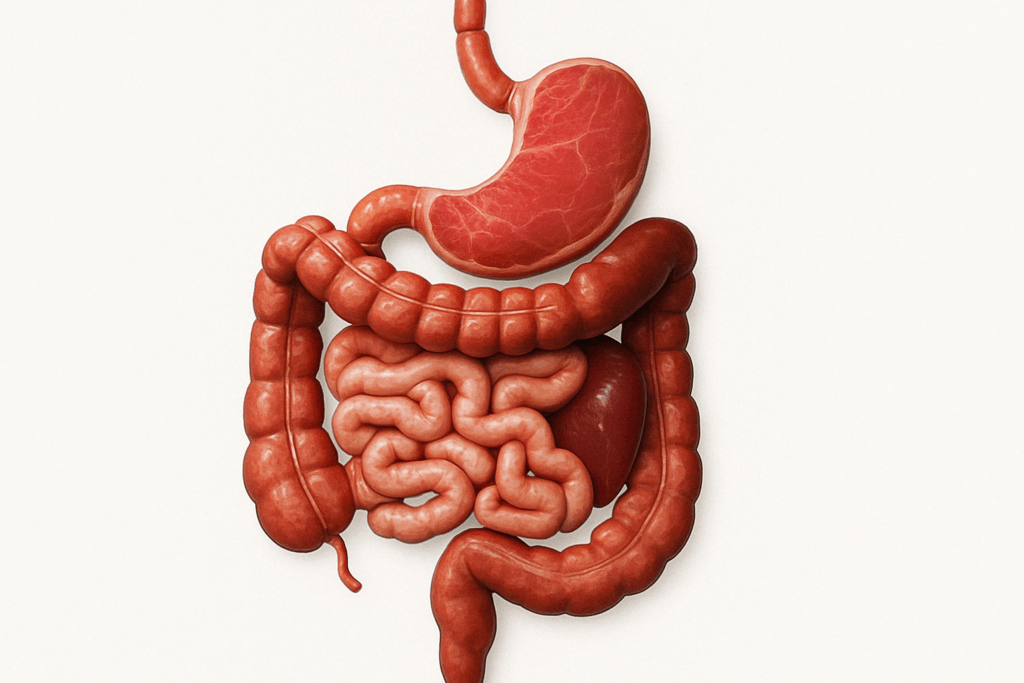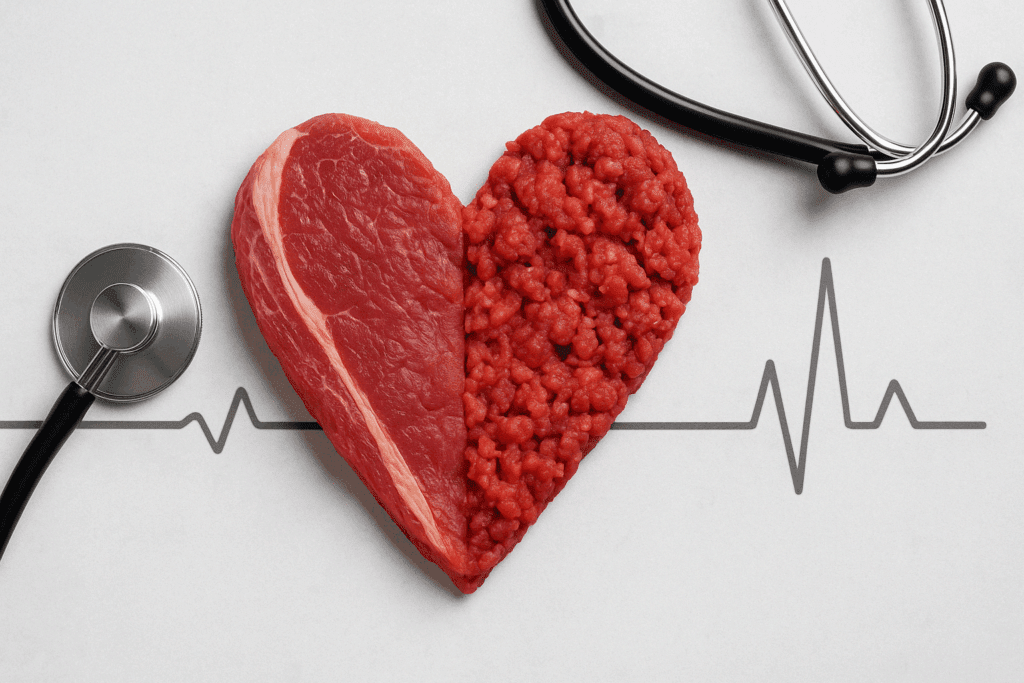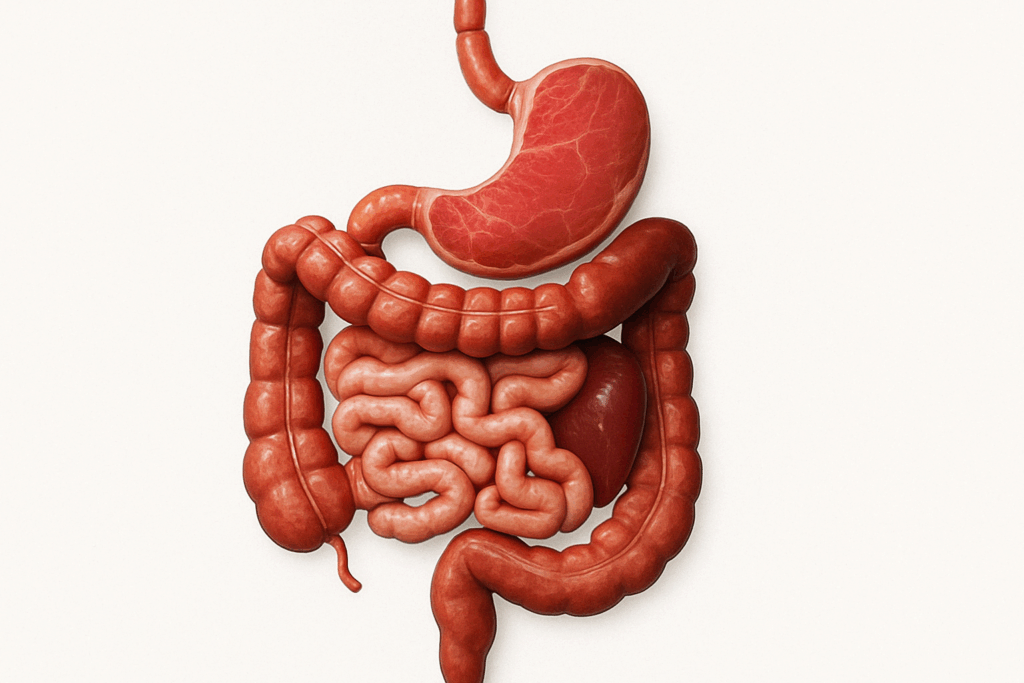In today’s nutrition landscape, where diets range from high-carb veganism to ultra-restrictive carnivore regimens, questions like “is a meat diet healthy?” have never been more relevant. For those considering eating only meat, or transitioning to a meat and vegetable diet, it’s essential to understand the short- and long-term health implications backed by scientific evidence. As more individuals ask what happens if you only eat meat for a week or explore the appeal behind a red meat diet plan, the importance of exploring carnivore diet health outcomes becomes increasingly critical.
This article examines the evidence surrounding the meat-heavy or only meat diet trend, including carnivore diet side effects, its relationship to heart disease, metabolic health, and long-term sustainability. Importantly, it also explores how the meat diet intersects with broader dietary frameworks like low carb and ketogenic diets, offering clarity on common questions such as “is keto a good diet?” or “is keto no carbs?”
You may also like: Plant Based Diet vs Standard American Diet: What the Latest Studies Reveal About Long-Term Health Outcomes
Understanding the Meat-Heavy Diet Trend
The rise in popularity of meat-centric eating plans, such as the carnivore diet, is largely driven by anecdotal success stories on weight loss, mental clarity, and reduced inflammation. Proponents of the beef diet often report improved energy and digestion when eating only meat. This diet typically eliminates all plant foods, dairy, legumes, and grains, favoring unprocessed animal products exclusively.
Supporters of this approach often come from a background of elimination diets or autoimmune protocols and argue that by removing plant-based antinutrients or irritants, symptoms of chronic illness improve. However, while short-term anecdotal reports abound, the long-term consequences of consuming only animal products are much less clear. Medical researchers are increasingly studying what happens if you only eat meat, and emerging science is beginning to answer these pressing questions.

What Happens If You Only Eat Meat?
The idea of eating only meat may seem extreme, but it’s a dietary experiment many people undertake for perceived benefits. Yet, it’s important to understand what happens if you just eat meat, both physiologically and metabolically. In the short term, individuals may see initial weight loss, largely due to a reduction in total calories and carbohydrates. Since the body shifts into a state of ketosis from this sudden carb restriction, many wonder: is keto a low carb diet, or is the carnivore diet simply an ultra-keto variant?
While the ketogenic diet vs low carb approaches both reduce carbohydrate intake, the carnivore diet removes them entirely. This puts extreme demand on fat metabolism, sometimes resulting in a ketogenic state. Though fat adaptation can lead to appetite suppression and weight reduction, the benefits may come at a cost. One of the most common carnivore diet side effects is constipation, due to the absence of dietary fiber. Other side effects include micronutrient deficiencies, elevated LDL cholesterol, and potential inflammation.
Scientific reviews have also flagged increased risks for cardiovascular disease when red meat intake is high. In particular, when asking is the carnivore diet bad for your heart, one must consider the saturated fat and heme iron load, both of which have been linked to heart disease risk. Though not everyone may experience the same outcomes, long-term reliance on a red meat diet plan could elevate health risks.

Carnivore Diet and Heart Disease: What the Evidence Reveals
The link between red meat consumption and heart health has long been debated. Epidemiological studies have consistently shown that diets high in processed meats are associated with greater cardiovascular risk. When evaluating carnivore diet and heart disease connections, it becomes important to distinguish between unprocessed and processed meat, as well as quantity and frequency of intake.
Clinical trials, such as the PURE study, have nuanced these findings by demonstrating that moderate unprocessed red meat consumption may not be as harmful when part of a balanced diet. However, a diet consisting entirely of meat removes the buffering effects of protective plant-based compounds like antioxidants, polyphenols, and fiber. These nutrients, found in vegetables, fruits, legumes, and whole grains, are known to counteract oxidative stress and support vascular function.
Thus, while some argue that a meat and vegetable diet may strike a balance, the only meat diet removes key components proven to reduce inflammation and prevent chronic illness. In individuals consuming a red meat diet plan exclusively, emerging studies suggest a pro-inflammatory environment may develop, increasing arterial stiffness and blood pressure. This raises important concerns about whether such an approach is sustainable and safe.

Why Do a Carnivore Diet? Examining the Appeal
Despite these risks, many individuals still ask: why do a carnivore diet at all? For some, the simplicity of removing all food groups except meat eliminates decision fatigue and reduces the need for calorie counting. Others turn to it as a last resort after struggling with autoimmune issues, IBS, or food allergies. The logic is that by stripping the diet to its most basic form—animal flesh—you eliminate most known dietary triggers.
While these motivations are understandable, they may not justify the long-term use of such an extreme approach, especially when science-backed, plant-based alternatives exist. In fact, extensive research on whole-food plant-based diets has shown that they can reduce inflammation, support heart health, and improve insulin sensitivity. The idea that a beef diet alone can replace the protective benefits of colorful plant foods is not supported by the majority of clinical evidence.
What Happens If You Only Eat Meat for a Week?
Short-term trials and anecdotal accounts do provide some insight into what happens if you only eat meat for a week. Most individuals report early satiety, reduced cravings, and some weight loss due to the absence of refined carbohydrates and sugars. However, side effects such as fatigue, digestive irregularities, and halitosis (“keto breath”) are not uncommon. Blood lipid panels often show an increase in LDL cholesterol and total cholesterol levels after just one to two weeks.
This early shift in biomarkers suggests that while some benefits may be experienced in the form of improved blood sugar control and reduced insulin, they may come with cardiovascular trade-offs. This raises the broader question: is keto a good diet if it improves glucose but worsens lipid profiles? The same applies to the carnivore diet. While there may be improvements in certain markers, the elevation of risk in other areas calls for a more balanced perspective.
Is a Keto Diet Sustainable Compared to a Carnivore Diet?
When comparing the keto diet vs low carb diet, or evaluating if the keto diet is sustainable, a few key differences emerge. The standard ketogenic diet allows for non-starchy vegetables, nuts, seeds, and even some low-glycemic fruits. This increases fiber and micronutrient intake and provides greater variety. A low carb diet, on the other hand, reduces carbohydrate intake but doesn’t typically restrict entire food groups.
The carnivore diet is the most extreme form of low carb, eliminating nearly all plant foods. While people often equate carnivore with keto, it’s important to remember that is keto a low carb diet? Yes. But carnivore is essentially zero carb, which magnifies the risks of long-term nutrient insufficiency. In this context, is a keto diet sustainable? The answer is more favorable when keto includes a range of non-meat whole foods. This flexibility is key to sustaining long-term health and dietary adherence.
Nutrient Deficiencies and Carnivore Diet Side Effects
Long-term adherence to a meat-only regimen may lead to notable nutrient deficiencies. Despite being rich in protein, iron, and vitamin B12, meat lacks several essential nutrients that the body requires, such as vitamin C, fiber, magnesium, and phytonutrients. Without dietary fiber, gut microbiome diversity diminishes, potentially contributing to chronic inflammation, poor immune function, and metabolic dysfunction.
Common carnivore diet side effects include gastrointestinal distress, muscle cramps from low magnesium, and signs of scurvy in rare cases. Additionally, the lack of plant-derived antioxidants may impair the body’s ability to repair oxidative damage. When examining is the carnivore diet bad for your heart, this absence of protective nutrients becomes particularly concerning.
Comparing Low Carb Diet, Keto Diet, and Carnivore Approaches
In the broader debate over keto diet vs low carb diet vs carnivore, the key differentiators come down to inclusion of plant foods and level of carbohydrate restriction. The low carb diet keto diet discussion centers around carbohydrate thresholds, with low carb typically allowing 50-150 grams per day, while ketogenic protocols aim for under 50 grams.
Is keto no carbs? Not exactly. A well-formulated ketogenic diet still includes leafy greens, cruciferous vegetables, and healthy fats from plant-based sources. In contrast, the carnivore diet restricts these foods entirely. This distinction matters when evaluating is keto a good diet for long-term use. A well-balanced keto diet may offer metabolic advantages while avoiding the severe limitations and health concerns associated with the only meat diet.
A Whole-Food Plant-Based Perspective on Health
Under the menu categories of Whole-Food Plant-Based Nutrition and Plant-Based Health, it’s important to highlight that science consistently supports the health benefits of plant-rich diets. Unlike the meat diet, which excludes fiber, antioxidants, and a host of other protective compounds, plant-based diets have been linked to improved cardiovascular outcomes, lower cancer risk, and increased longevity.
While some may find temporary benefits from reducing carbs, a more sustainable approach emphasizes low-glycemic, fiber-rich plants combined with healthy fats and adequate protein. These diets are not only more sustainable but also culturally inclusive, environmentally friendly, and nutritionally complete. This context is critical when evaluating is keto a low carb diet that supports long-term health, and whether the carnivore model can compare.
Weighing the Risks and Benefits of a Red Meat Diet Plan
Ultimately, a red meat diet plan can be effective for short-term weight loss or elimination of dietary triggers. However, these benefits must be weighed against the potential risks, particularly in relation to heart health, cancer risk, and micronutrient imbalances. Eating only meat may result in short-term energy and clarity, but over time, the absence of fiber and phytochemicals may compromise gut health, immunity, and metabolic resilience.
Furthermore, when considering is keto a good diet for metabolic syndrome, it’s essential to differentiate it from the carnivore model. Ketogenic diets rich in plant foods can reduce insulin resistance and inflammation, but a zero-carb, animal-only approach introduces a new set of complications. It may trigger higher homocysteine levels, worsen lipid panels, and reduce microbial diversity in the gut.

Frequently Asked Questions: Understanding the Health Implications of a Meat Diet
1. Can a meat diet support mental health, or does it increase the risk of mood disorders?
While anecdotal reports suggest that some individuals experience improved mood and mental clarity on a meat diet, the science presents a more nuanced picture. The absence of complex carbohydrates in an only meat diet may reduce serotonin production due to lower tryptophan transport into the brain, which could negatively affect mood over time. Moreover, long-term exclusion of plant-based omega-3 sources, such as walnuts and flaxseeds, may increase vulnerability to anxiety or depression. Conversely, some individuals may benefit from the elimination of processed foods and potential inflammatory triggers, which might temporarily improve mental well-being. However, a more balanced meat and vegetable diet may better support both gut and mental health by preserving fiber diversity and essential micronutrient intake.
2. What happens if you only eat meat in the context of athletic performance and recovery?
Eating only meat may initially support strength gains due to the high protein intake, particularly if following a beef diet rich in creatine and heme iron. However, performance may plateau or decline over time due to deficiencies in electrolytes, antioxidants, and glycogen-replenishing carbohydrates. Glycogen is a key energy source for anaerobic activity, and its absence can lead to fatigue and decreased endurance. Athletes who adopt a red meat diet plan without supplementation risk impaired recovery from oxidative stress and muscle damage. Incorporating some plants into a meat and vegetable diet may help offset these risks while maintaining high protein intake.
3. Are there social or psychological consequences associated with eating only meat long-term?
Yes, committing to an only meat diet can create unique social challenges, often limiting dining options and leading to social isolation. Food is deeply connected to culture, tradition, and shared experiences, and strict adherence to a beef diet can disrupt those social bonds. Psychologically, hyper-fixation on restrictive dietary rules may also contribute to disordered eating patterns or orthorexia. Moreover, anxiety around “non-approved” foods can increase when social interactions center on meals that don’t align with carnivore diet health guidelines. A more flexible meat and vegetable diet allows for social inclusion while still honoring personal dietary boundaries.
4. What additional carnivore diet side effects have been observed beyond what’s commonly discussed?
Beyond digestive issues and elevated cholesterol, lesser-known carnivore diet side effects include dry eyes, joint stiffness, and increased susceptibility to infections due to a compromised gut microbiome. The lack of prebiotic fibers reduces the abundance of beneficial bacteria that support immune modulation and vitamin synthesis. Skin issues such as eczema or acne have also been reported when plant-derived antioxidants are absent. Over time, the body’s resilience to oxidative stress may decline, increasing the risk of systemic inflammation. These issues are not universally experienced but are important to monitor when evaluating long-term carnivore diet health risks.
5. What happens if you only eat meat for a week—could there be benefits without long-term drawbacks?
Short-term experimentation with eating only meat may offer temporary relief for those with suspected food intolerances or autoimmune flares. For instance, some individuals use a one-week red meat diet plan as a dietary reset before reintroducing plant foods. This period may reduce bloating and stabilize energy levels due to the exclusion of fermentable carbs. However, nutrient depletion begins quickly, especially in vitamin C and magnesium, and constipation often occurs without fiber. A structured, short-term elimination trial under professional supervision can provide insights, but it should not replace a varied, long-term nutrition plan.
6. Is the carnivore diet bad for your heart even if you avoid processed meats and eat grass-fed options?
Even when consuming only unprocessed, grass-fed red meat, concerns about cardiovascular risk persist. The saturated fat content in a beef diet can elevate LDL cholesterol, and the high iron load may promote oxidative stress if not balanced by dietary antioxidants. While grass-fed meats offer a better fatty acid profile, they still lack the polyphenols and soluble fibers known to support heart health. The absence of potassium-rich plant foods may also lead to increased blood pressure over time. When considering carnivore diet and heart disease, it’s important to remember that nutrient diversity—not just meat quality—plays a protective role.
7. Why do a carnivore diet when plant-based alternatives offer many of the same anti-inflammatory benefits?
Some individuals choose a carnivore diet due to personal medical histories involving IBS, Crohn’s disease, or multiple food allergies, believing that removing all plant foods minimizes inflammatory triggers. However, these cases are highly individualized and not representative of the general population. For most, anti-inflammatory benefits can be achieved through a whole-food, plant-forward diet rich in omega-3s, turmeric, and antioxidant-rich vegetables. Moreover, plant-based approaches allow for greater long-term sustainability and reduced risk of nutritional deficiencies. While the appeal of simplicity is one reason why people ask why do a carnivore diet, it’s worth exploring if that simplicity compromises long-term health outcomes.
8. Could a red meat diet plan influence hormonal balance or fertility in men and women?
Emerging evidence suggests that high intake of animal fats, particularly from an only meat diet, can affect hormonal function. In men, excessive intake of saturated fats may lead to reduced testosterone sensitivity, while in women, it may contribute to menstrual irregularities due to altered estrogen metabolism. On the other hand, sufficient cholesterol intake is required for hormone production, which a meat diet certainly supplies. The issue is not meat consumption itself, but the absence of phytoestrogens, fiber, and essential plant nutrients that help regulate hormonal rhythms. A meat and vegetable diet may offer a more balanced approach for those looking to support reproductive health while still emphasizing animal-based foods.
9. What happens if you just eat meat but still use supplements to cover nutrient gaps?
Taking supplements while eating only meat may reduce some of the risks associated with the carnivore diet, such as scurvy or magnesium deficiency. However, this approach doesn’t address the loss of synergy between whole foods and their naturally occurring compounds. For example, isolating vitamin C in pill form doesn’t replicate the benefits of citrus fruit, which contains bioflavonoids that enhance absorption. Furthermore, gut health suffers in the absence of fermentable fibers, regardless of supplemental probiotic intake. While supplementation can make a red meat diet plan slightly more viable, it still lacks the richness and complexity of a diversified eating pattern.
10. Is a meat diet healthy in the context of aging and longevity?
When considering aging, a meat diet may help preserve muscle mass due to its high protein content, which is especially beneficial in preventing sarcopenia. However, studies on longevity consistently show that populations with the highest life expectancy consume diets abundant in plant foods, particularly legumes, whole grains, and vegetables. Chronic low-grade inflammation, which contributes to aging, is often mitigated by plant-derived antioxidants, absent from an only meat diet. Moreover, gut microbiota diversity tends to decline with age, and eating only meat may accelerate this process. For those concerned with aging gracefully, a meat and vegetable diet is likely more supportive of both mobility and metabolic resilience over time.

Conclusion: Is a Meat Diet Healthy in the Long Run?
So, is a meat diet healthy? The answer, based on current scientific evidence, is nuanced. While some people may benefit in the short term from removing highly processed foods and stabilizing blood sugar, the long-term risks of eating only meat are significant. Carnivore diet side effects, such as nutrient deficiencies and cardiovascular stress, raise serious concerns about sustainability and safety.
The question of what happens if you just eat meat or whether the carnivore diet is bad for your heart becomes increasingly urgent in light of emerging research. Ultimately, diets that completely exclude plant-based foods fail to deliver the full spectrum of nutrients needed for long-term health. When comparing the meat diet to a meat and vegetable diet or a well-planned ketogenic diet, it becomes clear that inclusion of plant foods offers protective benefits without the downsides of strict carnivory.
As for the broader question of is keto a good diet, or is keto no carbs, the answer is context-dependent. A flexible, nutrient-rich ketogenic diet that includes non-starchy vegetables is vastly more sustainable and health-promoting than a meat-only approach. When integrated into a whole-food, plant-based framework, low carb diets can indeed support weight loss and metabolic health, without sacrificing longevity or cardiovascular resilience.
Choosing a health-promoting dietary pattern means looking beyond fads and embracing balance. In doing so, we align with a growing body of science that consistently affirms the power of whole, plant-based foods to fuel our bodies, protect our hearts, and support vibrant health over the long haul.
Was this article helpful? Don’t let it stop with you. Share it right now with someone who needs to see it—whether it’s a friend, a colleague, or your whole network. And if staying ahead on this topic matters to you, subscribe to this publication for the most up-to-date information. You’ll get the latest insights delivered straight to you—no searching, no missing out.
Further Reading:
Is The Carnivore Diet Healthy?
All You Need to Know About the Carnivore (All-Meat) Diet
Disclaimer
The information contained in this article is provided for general informational purposes only and is not intended to serve as medical, legal, or professional advice. While NewsHealthWatch strives to present accurate, up-to-date, and reliable content, no warranty or guarantee, expressed or implied, is made regarding the completeness, accuracy, or adequacy of the information provided. Readers are strongly advised to seek the guidance of a qualified healthcare provider or other relevant professionals before acting on any information contained in this article. NewsHealthWatch, its authors, editors, and contributors expressly disclaim any liability for any damages, losses, or consequences arising directly or indirectly from the use, interpretation, or reliance on any information presented herein. The views and opinions expressed in this article are those of the author(s) and do not necessarily reflect the official policies or positions of NewsHealthWatch.

